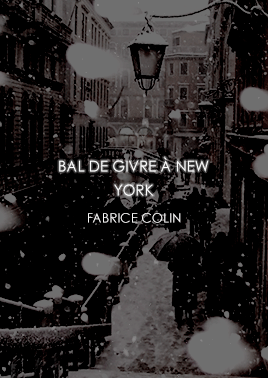It’s Essay Writing Season For Tons Of Students!
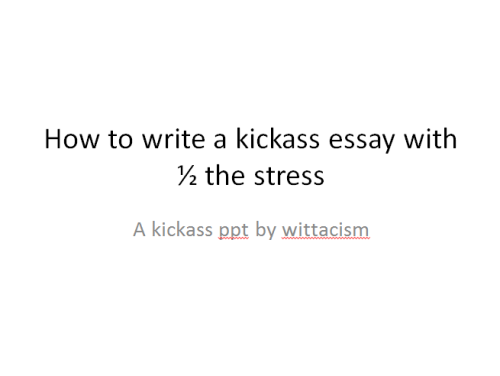


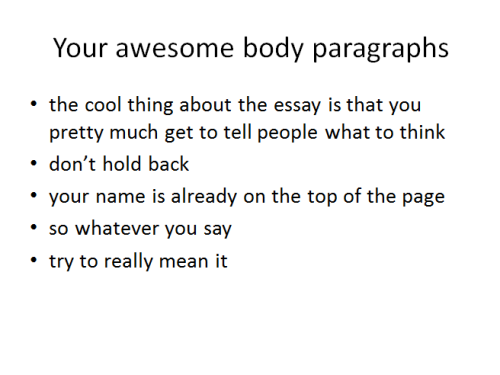
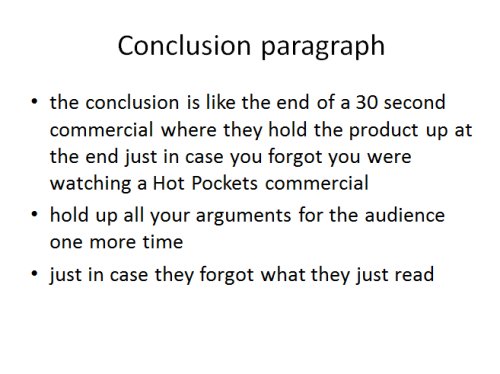
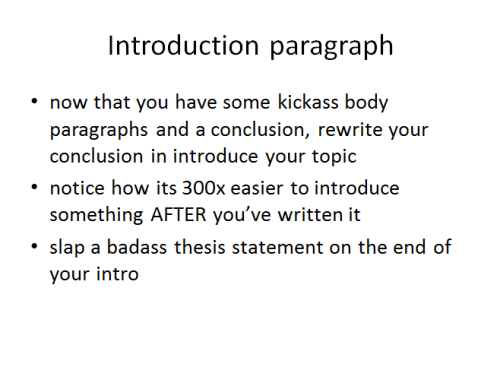
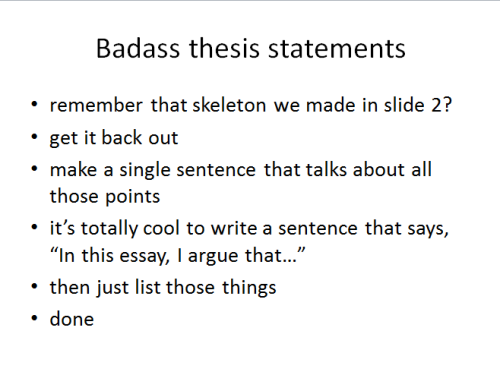
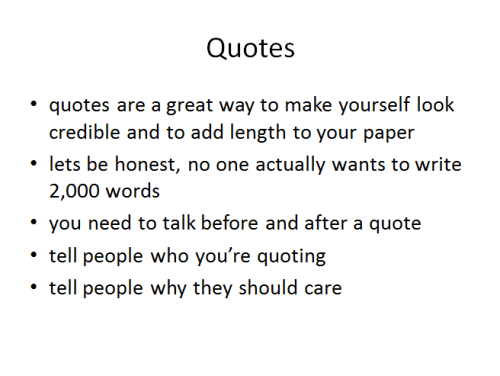
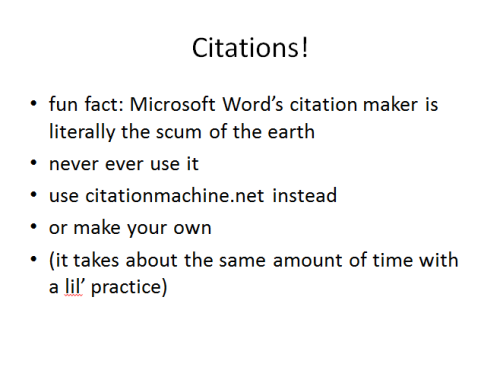

It’s essay writing season for tons of students!
After being a college writing tutor for over a year, I thought I would share my advice with all you awesome people on tumblr. This is how I write essays, but if you’ve got more tips, feel free to add them below.
Happy writing. You can do it!
More Posts from Edu-fuck-cated and Others
A beginner's guide
Bonjour! Is there a list of things that a french beginner should learn, is there a specific order to learn topics in french? Also, love your blog, it helps me a lot.
*
Hello, thanks love you too! Here's roughly how to proceed:
#1. Genders.
Nouns, adjectives, determiners and past participles in French are either masculine or feminine. There is no neutral.
Known: LE/LA/L’ (+ vowel) + singular, LES + plural (The girl)
Unknown: UN/UNE + singular, DES + plural (A cat)
Uncountable: DU/DE LA + singular, DES + plural (Sugar)
How do I know what gender an item is?
Those that end with a consonant are likely masculine (Un éléphant), those that end with an -e likely feminine (Une girafe), especially if it follows a couple of the same consonant (Une tasse). A noun or adjective can be ‘gender-neutral’, or épicène (Juge, Drôle). There are obviously exceptions (Nation, Incendie).
What’s an uncountable item?
It’s a group of items that are either too small or too large to be counted: fruit, sugar, flour, people, etc (ex: Du sable, Des gens).
Let’s practice: Le facteur et la boulangère sont mariés. La ministre est sortie. Un chien aboie dehors. J’ai mangé du pain.
#2. Numbers.
To turn a singular into a plural, adding an -s is your most popular option. It can also be an -x (Bijou, Feu), nothing if the singular ends in -z, -s, -x (Nez); some words only exist as plurals (Ciseaux). There are a few irregulars (Oeil/yeux, Monsieur/messieurs, Madame/mesdames, Animal/animaux).
Let’s practice: J’ai deux petits frères qui sont nés (past participle) en 1998. J’ai un chat sur les genoux. Il y a des noix dans mes gâteaux. Mes yeux sont noirs.
#3. Verbs.
Verbs belong to one of three groups: -er except Aller (90%), -ir with a few exceptions, and the bin (auxiliaries Être and Avoir, Aller, -re, -oir, -ir exceptions). They can be modal (Should) or reflexive: preceded by an object pronoun (Je m’appelle).
The most useful verbs are:
Être: to be, avoir: to have, faire: to do/make, dire: to say, pouvoir: can, aller: to go, voir: to see, savoir: to know, vouloir: want, venir: to come, falloir: to have to, devoir: must, croire: to believe, trouver: to find, donner: to give, prendre: to take, mettre: to put down/place, laisser: to let, to need: avoir besoin de (...)

#4. Tenses.
The most useful tenses are:
Indicative present (J'aime le fromage - I like cheese)
Imperfect (J'aimais le fromage - I liked cheese)
Perfect (J'ai aimé le fromage - I have liked cheese)
Future (J'aimerai le fromage - I will like cheese)
Present conditional (J'aimerais le fromage - I would like cheese)
Present subjunctive (Je veux que tu prennes le fromage - I want you to take the cheese) triggered by certain verbs + que.
N.B.: There are irregular past participles (Être: été, Avoir: eu, Voir: vu, etc.).
Let’s practice: Je ne sais pas. Il dessinait bien. Nous sommes venus. Ils te verront quand ils reviendront. Vous seriez partis tôt.
#5. Function words.
Personal pronouns: Tu manges du pain
Demonstrative pronouns: Celui de ma soeur est mieux
Possessive determiners: C'est ton chien
Contracted words: Elle est au parc
Coordinating conjunctions: J'y vais mais j'ai peur
Subordinating conjunctions: Je demanderai quand il rentrera
Linkers: On se voit plus tard
Let’s practice: Je crois qu’elle sera à l’heure mais je peux me tromper. Pourquoi est-ce que tu pars? Nous reviendrons plus tard, quand il fera plus beau. Vous ne devez pas être en retard sans raison. C’est là, celle à droite.
#6. Basic knowledge.
Accents
Adverbs
Calendar
Colours
Conversation
En + Y
Family
Food
Negations
Numbers
Prepositions
Questions
Relative pronouns
Terminations
Time
Tu or Vous
*
As you're mastering those, start practising.
Listen to music, podcasts, books while looking at the transcription - don't translate, get used to the pronunciation and the word chewing. Record yourself reading.
Then, start reading. I recommend starting with children's literature, especially books you already know in English. Things like Le petit prince or Perrault's fairytales should be accessible.
Use Reverso and Deepl as if you were paid to.
Study the pronunciation posts. The devil is in the details.
Learn vocabulary every week. Avoid translating English word by word, it's often a fool's bet; make a simpler sentence instead.
Explore my grammar tag once in a while.

RESOURCE FOR (major) AP TESTS
Yo!! for those of you students (or not) who’re taking AP tests, there’s this channel called Crash Course that has a bunch of AP-related series. each video’s between 10-15 minutes long and a lot of students use them as review or catch-up on stuff that their class skimmed over/stuff they didn’t understand or missed. Here are the ones that I know are for sure AP courses:
AP World History (also, if you want a more in-depth look at a lot of these topics, check out World History 2 as well)
AP US History
AP Ecology
AP Biology
AP Chemistry
AP English Literature (in terms of analysis and close reading, not so much about paragraph and essay styles…sorry, if anyone’s got a good source for that, please reblog and add some sources)
AP Psychology (helped me get a 5 on the ap psych test, no joke!!)
AP United States Government and Politics
AP Micro- and Macro-economics* (I believe, feel free to contest this)
AP Physics* (not sure which specific tests these videos cover) - (MinutePhysics is also a good source for specific topic in physics)
* indicates series that are, as of May 3rd 2016, still running/incomplete
If anyone has any other AP-related testing help (in terms of subject matter, not how to take the test), please reblog and add more. I hope y’all pass your tests!!
donner (to give)✨, prendre (to take) ✨recevoir (to get)✨ present tense
donner - to give 🕊️🕊️🕊️🕊️🕊️🕊️🕊️🕊️
je donne [I give]
tu donnes [you give]
il/elle/on donne [he/she/it/ gives]
nous donnons [we give]
vous donnez [you give]
ils/elle donnent [they give]
prendre - to take 🕊️🕊️🕊️🕊️🕊️🕊️🕊️🕊️
je prends [I take]
tu prends [you take]
il/elle/on prend [he/she/it takes]
nous prenons [we take]
vous prenez [you take]
ils/elles prennent [they take]
recevoir - to get 🕊️🕊️🕊️🕊️🕊️🕊️🕊️🕊️
je reçois [I get]
tu reçois [you get]
il/elle/on reçoit [he/she/it gets]
nous recevons [we get]
vous recevez [you get]
ils/elles reçoivent [they get]
ULTIMATE Japanese Language Learning Resources List

Symbol Guide:
✅All levels 🛠Tool ⏫Advanced 📚Textbook 🔼Intermediate 🗞️Newspaper ⬇️Beginner 🖥️Website ⏬Absolute Beginner 🎮Interactive/Game 📱Mobile Application

HIRAGANA & KATAKANA
⏬🛠Hiragana Mnemonics Chart ⏬🛠Giant List of Mnemonics Charts ⏬🛠English to Katakana Converter ⏬🎮Kana Invaders ⏬🎮Realkana ⏬🎮Hiragana Practice ⏬🎮Katakana Practice ⏬🎮Hiragana and Katakana Practice ⏬🖥️Learn Katakana: The Ultimate Guide ⏬🖥️Learn Hiragana and Katakana on YouTube ⏬📱Learn Hiragana and Katakana ⏬📱iKana

KANJI
✅🛠Self-Study Kanji Flashcards ✅🛠Suiren ✅🛠Stroke Order ✅🛠Kanji Radicals and their Meanings ✅🛠 iKanji ✅🛠How to find the Kanji Radical ✅🖥️Kanji Damage ✅🖥️WaniKani ✅🖥️Memrise ✅🖥️Kanji Kentei ✅🖥️The Kanji Map ✅📱Skritter ⏫🖥️4-Kanji Vocabulary (Yojijukugo) 🔼📚Tobira: Gateway to Advanced Japanese ⬇️🖥️Renshuu ⬇️🖥️Nimonikku ⏬📚Kanji Look and Learn ⏬📚Kodansha Kanji Learning Course

VOCABULARY
✅🛠Language Pal Pack: Questions to Kickstart Conversation ✅🛠Suiren ✅🖥️Memrise ✅🖥️WordReference Forums ✅🎮iKnow! Japanese Core Vocabulary Decks ⏫🖥️4-Kanji Vocabulary (Yojijukugo) 🔼🖥️Japanese Onomatopoeia 🔼🛠Keigo Cheatsheet 🔼📚Tobira: Gateway to Advanced Japanese 🔼📚Common Japanese Collocations 🔼📚Speed Master Series ⬇️🖥️Renshuu ⏬🖥️6000 most used words ⏬🖥️1000 Basic Words ⏬📚Elementary School Dictionary

GRAMMAR
✅🛠All Verb Conjugations Cheatsheet ✅🖥️Tatoeba ✅🖥️JGram ✅🖥️MaggieSensei ✅🖥️Bunpro ✅📚Dictionary of Japanese Grammar and Verbs ✅📚Donna Toki, Dou Tsukau ⏫📚A Dictionary of Advanced Japanese Grammar ⏫📚Nihongo Bunkei Jiten 🔼📚A Dictionary of Intermediate Japanese Grammar 🔼📚Tobira: Gateway to Advanced Japanese ⬇️📚A Dictionary of Basic Japanese Grammar ⬇️🖥️Nihongo Resources ⬇️🖥️Renshuu ⏬🖥️TaeKim’s Guide to Japanese ⏬🖥️Learn Japanese with Erin ⏬📚All about Particles ⏬📚Genki Series ⏬📚Japanese from Zero

READING
✅🛠Japanese.io ✅🛠Read More Or Die ✅🛠Text Analysis ✅🛠Tenjin Reader ✅🖥️Satori Reader ✅🖥️Reajer ⏫🗞️NHK News ⏫🗞️Yomiuri Newspaper ⏫🗞️Nikkan Gendai ⏫🖥️ Read Manga Online 🔼🗞️High School Newspaper 🔼🗞️Kodomo Asahi (Kid’s Asahi News) 🔼🖥️Japanese Subreddits 🔼🖥️The Great ChokoChoko Library ⬇️🖥️Japanese Reading Practice For Beginners ⬇️🖥️Real World Japanese ⬇️🗞️NHK Easy News ⬇️🗞️NHK Easier

WRITING
✅🖥️Lang 8 ✅🛠All Verb Conjugations Cheatsheet ✅🛠How to write on Japanese essay paper (Genkouyoushi) ✅🛠Japanese Journal Writing Beginners to Advanced ⏫🛠Phrases for report writing

LISTENING
✅🛠Language Pal Pack: Questions to Kickstart Conversation ✅🖥️RhinoSpike ✅🖥️NHK WORLD TV ✅🖥️Documentaries About Japan You Can Watch For Free ✅🖥️Top 5 Japanese Dramas ⏫🛠Japanese Audiobooks List ⏫🛠Japanese Audiobooks 2 ⏫🖥️Bilingual News 🔼🖥️TBS News 🔼🛠Japanese Drama Subtitles 🔼🛠Japanese Drama Subtitles 2 ⬇️🗞️NHK Easy News ⬇️🗞️NHK Easier ⬇️🖥️Learn Japanese Pod ⬇️🖥️Erin’s Challenge! ⬇️🖥️Nihongo de Kurasou

SPEAKING
✅🛠Language Pal Pack: Questions to Kickstart Conversation ✅🖥️Make Language Pals ✅🖥️RhinoSpike ✅📱HelloTalk ✅🎮Rosetta Stone Japanese ✅📚Japanese Accent Dictionary ✅🛠Japanese Accent Guide

DICTIONARIES/TRANSLATION TOOLS
✅🛠Kotobank ✅🛠Tangorin ✅🛠Weblio ✅🛠Jisho.org ✅🛠ALC ✅🛠Ninjal-LWP ✅🛠WWWJDIC ✅📚Dictionary of Japanese Grammar and Verbs ✅📚Japanese Accent Dictionary ⏫📚A Dictionary of Advanced Japanese Grammar 🔼📚A Dictionary of Intermediate Japanese Grammar ⬇️📚A Dictionary of Basic Japanese Grammar ⏬📚Elementary School Dictionary ⏬📚All about Particles

JLPT
✅🖥️JLPT Website ✅🖥️TANOS ✅🖥️JLPT Study Plan ✅🖥️Last Minute Resources ✅🖥️Sample Practice Tests ✅📚Nihongo So Matome ✅📚Donna Toki, Dou Tsukau ✅📚New Kanzen Master 🔼📚Speed Master Series

SOFTWARE & APPS
✅📱Anki SRS ✅📱Japanese ✅📱HelloTalk ✅📱Skritter ✅🛠Rikaichan (Firefox) ✅🛠Rikaikun (Chrome) ✅🛠 iKanji ✅🎮Rosetta Stone Japanese

TEXTBOOKS
✅📚Nihongo So Matome ✅📚Donna Toki, Dou Tsukau ✅📚Dictionary of Japanese Grammar and Verbs ✅📚New Kanzen Master ⏫📚A Dictionary of Advanced Japanese Grammar ⏫📚Nihongo Bunkei Jiten 🔼📚A Dictionary of Intermediate Japanese Grammar 🔼📚Tobira: Gateway to Advanced Japanese ⬇️📚A Dictionary of Basic Japanese Grammar ⏬📚Elementary School Dictionary ⏬📚All about Particles ⏬📚Genki Series ⏬📚Japanese from Zero
More resources available here.

un chat / une chatte a cat (m.) / (f.) un chaton a kitten un matou a tomcat un chat domestique a house cat / a domestic cat un (chat) persan a persian cat un (chat) siamois a siamese cat un (chat) tigré a tabby cat le pélage, le poil fur les pattes (f.) paws les griffes rétractiles retractable claws la queue tail une litière a litter box une chatière a cat flap / a cat door la nourriture pour chat cat food ronronner to purr miauler to meow feuler to yowl
Aimer Conjugation
j’aime = I love
tu aimes = you love
il aime = he loves
elle aime = she loves
nous aimons = we love
vous aimez = you love (formal; plural)
ils aiment = they love (masculine)
elles aiment = they love (feminine)
.
Patreon | Ko-fi
Basic conversation
Hellos :
Bonjour (good day), bonsoir (good evening, from 5/6 pm) (formal)
Salut, coucou (childish), hola, hey (informal)
Hello (without pronouncing the h-) (mostly informal)
Yo, wesh (ironical, ‘ghetto’ slang) (very informal)
Allô (on the phone - neutral)
Introduction :
Je suis ravi-e de vous rencontrer (nice to meet you - formal)
Enchanté-e (charmed - formal)
Je m’appelle X (’I’m called X’)
Je suis la fille de Y (I am Y’s daughter)
J’ai vingt-six ans (’I have 26 years’)
Je vis à paris, en france (I live in paris, france)
Je travaille dans la publicité (I work in advertisement)
J’ai les cheveux bruns et les yeux verts (I have brown hair and green eyes)
Je mesure un mètre soixante-dix pour cinquante kilos (I’m 5′7/110 lbs)
J’ai deux frères mais pas de soeur (I have two brothers but no sister)
Questions :
Comment allez-vous/vas-tu ? (how are you?)
Comment vous appelez-vous/t’appelles-tu? (what’s your name?)
Quel âge avez-vous/as-tu ? (how old are you?)
Où vivez-vous/vis-tu? (where do you live?)
Est-ce que tu as un-e copain/copine? (do you have a so? - informal)
Quel-le(s) est/sont ton/ta/tes/votre(s) x préféré-e(s)/favori-te(s)?
Que faites-vous/fais-tu dans la vie? (what do you do for a living?)
Combien mesurez-vous/mesures-tu? (how tall are you?)
Comment va votre/ta famille? (how’s the family?)
Thanks :
Merci (thank you - neutral)
Merci beaucoup (thank you very much - neutral)
C’est très gentil (that’s very nice - neutral)
C’est très généreux de votre/ta part (it’s very generous of you - formal)
Un grand merci pour votre/ton aide (many thanks for your help - neutral)
Vous n’auriez/tu n’aurais pas dû (you shouldn’t have - neutral)
Mille mercis (a thousand thanks - very formal)
Cimer (verlan - very informal)
You’re welcome :
De rien (informal)
Ce n’est rien (formal)
Pas de problème/soucis (informal)
Avec plaisir (formal)
Je t’ / vous en prie (neutral)
Il n’y a pas de quoi (neutral)
Sorrys :
Je suis désolé-e (after a mistake, i’m sorry - neutral)
Pardon (sorry, after a mistake or in a crowd - neutral)
Excusez-moi (in a crowd, neutral)
Veuillez m’excuser (to excuse yourself, very formal)
Je suis (vraiment) navré-e (after a big mistake, very formal)
Je regrette (i wish that didn’t happen/i didn’t - neutral)
Goodbyes :
Au revoir (goodbye - neutral)
À bientôt (see you soon - neutral)
À tout de suite (see you in a bit - neutral)
À demain/mardi (see you tomorrow/on Tuesday - neutral)
À la semaine prochaine (see you next week - neutral)
À tout à l’heure (see you later today - neutral)
Bonne journée/soirée/nuit (good day, evening, night - neutral)
Ravi-e de vous avoir connu-e(s)/rencontré-e(s) (glad we met - formal)

Les nationalités
1. American▪︎américain/américaine
2. Argentinian▪︎argentin/argentine
3. Algerian▪︎algérien/algérienne
4. Australian▪︎australien/australienne
5. Austrian▪︎autrichien/autrichienne
6. Belarusian▪︎biélorussien/biélorussienne
7. Belgian▪︎belge/belge
8. Brazilian▪︎brésilien/brésilienne
9. Bulgarian▪︎bulgare/bulgare
10. Canadian▪︎canadien/canadienne
11. Chinese▪︎chinois/chinoise
12. Colombian▪︎colombien/colombienne
13. Canadian▪︎canadien/canadienne
14. Cuban▪︎cubain/cubaine
15. Czech▪︎tchèque/tchèque
16. Dane▪︎danois/danoise
17. Dutch▪︎néerlandais/néerlandaise
18. Egyptian▪︎égyptien/égyptienne
19. English▪︎anglais/anglaise
20. Estonian▪︎estonien/estonienne
21. Finn▪︎finlandais/finlandaise
22. French▪︎français/française
23. German▪︎allemand/allemande
24. Greek▪︎grec/grecque
25. Hungarian▪︎hongrois/hongroise
26. Icelandic▪︎islandais/islandaise
27. Indian▪︎indien/indienne
28. Irish▪︎irlandais/irlandaise
29. Italian▪︎italien/italienne
30. Japanese▪︎japonais/japonaise
31. Korean▪︎coréen/coréenne
32. Latvian▪︎letton/letonne
33. Lithuanian▪︎lituanien/lituanienne
34. Macedonian▪︎macédonien/macédonienne
35. Mexican▪︎mexicain/mexicainne
36. New Zealander▪︎néo-zélandais/néo-zélandaise
37. Norwegian▪︎norvégien/norvégienne
38. Pole▪︎polonais/polonaise
39. Portuguese▪︎portugais/portugaise
40. Romanian▪︎roumain/roumaine
41. Russian▪︎russe/russe
42. Scottish▪︎écossais/écossaise
43. Slovak▪︎slovaque/slovaque
44. Slovene▪︎slovène/slovène
45. Spanish▪︎espagnol/espagnole
46. Swede▪︎suédois/suédoise
47. Swiss▪︎suisse/suisse
48. Turk▪︎turc/turque
49. Ukrainian▪︎ukrainien/ukrainienne
50. Welsh▪︎gallois/galloise
i will do another fifty soon to include the ones i left out. please correct me if i made any mistakes!
-
 school-study-tipss reblogged this · 2 months ago
school-study-tipss reblogged this · 2 months ago -
 nevaehnisa reblogged this · 2 months ago
nevaehnisa reblogged this · 2 months ago -
 fairy-mares liked this · 2 months ago
fairy-mares liked this · 2 months ago -
 simsimousse liked this · 2 months ago
simsimousse liked this · 2 months ago -
 chancellorcannoli reblogged this · 2 months ago
chancellorcannoli reblogged this · 2 months ago -
 bobthebenevolentpirate liked this · 2 months ago
bobthebenevolentpirate liked this · 2 months ago -
 urlove-crt liked this · 3 months ago
urlove-crt liked this · 3 months ago -
 whiskey-and-plaid liked this · 3 months ago
whiskey-and-plaid liked this · 3 months ago -
 arquivovivo reblogged this · 3 months ago
arquivovivo reblogged this · 3 months ago -
 metalminotaur reblogged this · 3 months ago
metalminotaur reblogged this · 3 months ago -
 metalminotaur liked this · 3 months ago
metalminotaur liked this · 3 months ago -
 xx-slavi-lad-xoxo reblogged this · 3 months ago
xx-slavi-lad-xoxo reblogged this · 3 months ago -
 xx-slavi-lad-xoxo liked this · 3 months ago
xx-slavi-lad-xoxo liked this · 3 months ago -
 tinywheat liked this · 4 months ago
tinywheat liked this · 4 months ago -
 countcrow liked this · 4 months ago
countcrow liked this · 4 months ago -
 parttimepunner reblogged this · 4 months ago
parttimepunner reblogged this · 4 months ago -
 saltmatchescandlewax reblogged this · 4 months ago
saltmatchescandlewax reblogged this · 4 months ago -
 missing-link47 reblogged this · 4 months ago
missing-link47 reblogged this · 4 months ago -
 missing-link47 liked this · 4 months ago
missing-link47 liked this · 4 months ago -
 white-caged-bird reblogged this · 4 months ago
white-caged-bird reblogged this · 4 months ago -
 asterries reblogged this · 4 months ago
asterries reblogged this · 4 months ago -
 vintagebishx liked this · 5 months ago
vintagebishx liked this · 5 months ago -
 meltyman666 liked this · 5 months ago
meltyman666 liked this · 5 months ago -
 creekchubsucker reblogged this · 5 months ago
creekchubsucker reblogged this · 5 months ago -
 avillagecalledwaset liked this · 5 months ago
avillagecalledwaset liked this · 5 months ago -
 sleepydreameroncloud9 reblogged this · 5 months ago
sleepydreameroncloud9 reblogged this · 5 months ago -
 baliffcastorskybound liked this · 5 months ago
baliffcastorskybound liked this · 5 months ago -
 ooshiegushie reblogged this · 5 months ago
ooshiegushie reblogged this · 5 months ago -
 picturesquelyperfect liked this · 5 months ago
picturesquelyperfect liked this · 5 months ago -
 notfye reblogged this · 5 months ago
notfye reblogged this · 5 months ago -
 d1rty-dopam1ne reblogged this · 6 months ago
d1rty-dopam1ne reblogged this · 6 months ago -
 d1rty-dopam1ne liked this · 6 months ago
d1rty-dopam1ne liked this · 6 months ago -
 kennedypeterson liked this · 6 months ago
kennedypeterson liked this · 6 months ago -
 lemedstudent2021 liked this · 6 months ago
lemedstudent2021 liked this · 6 months ago -
 multidimensionalfang1rl liked this · 6 months ago
multidimensionalfang1rl liked this · 6 months ago -
 trashpandaperson liked this · 6 months ago
trashpandaperson liked this · 6 months ago -
 lostinthecosmos2 liked this · 7 months ago
lostinthecosmos2 liked this · 7 months ago -
 hollowheartache reblogged this · 7 months ago
hollowheartache reblogged this · 7 months ago -
 wluvfrmme reblogged this · 7 months ago
wluvfrmme reblogged this · 7 months ago -
 wluvfrmme liked this · 7 months ago
wluvfrmme liked this · 7 months ago -
 11m-artrefninspo-reblogs reblogged this · 7 months ago
11m-artrefninspo-reblogs reblogged this · 7 months ago -
 11monsterman liked this · 7 months ago
11monsterman liked this · 7 months ago -
 annad422b liked this · 7 months ago
annad422b liked this · 7 months ago






